Nursing Survival Guide
Before you can succeed in nursing, you have to prepare for survival…
Surviving a registered nurse (RN) career – or any type of nurse’s career – is not a herculean task; but it can be as challenging as it is rewarding. Luckily, today’s nursing students have a wealth of online resources they can use to stay sane, and on track while they complete their coursework, clinical rotations, residencies, capstones, and research projects.
Once you complete your registered nursing program or other nurse education/training, you can shift your attention to career-oriented resources that can help you ace your first interview, transition from passing the NCLEX to applying for your first nursing job, and other helpful information for new professionals.
We hope these nursing school survival tips are useful in whichever phase of your education or career you are in.
Want to Learn More About Nursing? Start Here…
New Nurse Survival Guide
Choosing a nursing degree
Please select the option that describes your situation. Then click on the degrees that appear below it to learn more.
Options for your next degree
Options after that
I am a:
LPN
ADN
Pre-Licensure BSN
Post-Licensure BSN
Direct Entry MSN
LPN to RN
RN to BSN
RN to MSN
MSN
DNP
PhD
Licensed Practical Nurse/Licensed Vocational Nurse
Why you should get this degree
An LPN is the fastest way into entry-level nursing, with programs completed in as little as one year.
Why a different degree might be better
Career growth is limited, though unless you pursue further education, such as an ADN or BSN.
Job options
Job opportunities include work in nursing homes, hospitals, doctors’ offices, clinics, or in home health.
Median Salary
Median Salary = $48,820. (BLS, 2020)
Find degree programs
Associate Degree in Nursing / Nursing Diploma
Why you should get this degree
According to the Future of Nursing: Campaign for Action, 45.2 percent of registered nurses start out with an ADN – a good choice for those looking for a patient-care-centric program that takes a bit less time to complete than a BSN.
Why a different degree might be better
There’s little difference between the ADN and BSN degree when it comes to direct patient care jobs, but if you are looking for management or even public health oriented positions, you’ll want to consider the BSN.
Job options
The majority of RNs work in hospitals, but other locations include schools, physicians’ offices, nursing homes, government agencies and more.
Median Salary
Median Salary = $75,330. (BLS, 2020)
Find degree programs
Pre-Licensure Bachelor of Science in Nursing
Why you should get this degree
An influential nursing report called for the number of BSN-prepared nurses to grow to 80 percent by 2020 – the four-year BSN is increasingly becoming the choice entry-level, nursing degree among employers and the one that gives new nurses the widest selection of career paths.
Why a different degree might be better
If pursuing a BSN isn’t feasible due to time or financial constraints, start with an LPN or ADN, either of which will allow you to support yourself as a nurse more quickly than the BSN and then seek further education at your own pace.
Job options
With a BSN you can work in doctors’ offices, long term care facilities, community health centers, hospitals and specialty units like oncology or labor and delivery, among others.
Salary
BSN-prepared RNs are more likely to earn salaries well above the average for registered nurses as a whole. The top 25% salary for RNs comes in at $93,590. (BLS, 2020)
Find degree programs
Post-Licensure Bachelor of Science in Nursing
Why you should get this degree
If you’ve already earned a bachelor’s degree in a field other than nursing, one of your best options is the accelerated BSN, which will give you credit for the general ed. requirements you’ve already fulfilled and let you earn your nursing license in about 12 to 18 months.
Why a different degree might be better
Depending on your goals post nursing degree, a direct entry MSN, which can let you specialize and take on management or education related roles, may be more appropriate for you than the accelerated BSN.
Job options
As a second career nurse your prior experience might open you up to unique opportunities that make use of your already developed area of expertise, for example nursing informatics.
Salary
BSN-prepared RNs are more likely to earn salaries well above the average for registered nurses as a whole. The top 25% salary for RNs comes in at $93,590. (BLS, 2020)
Find degree programs
Direct Entry Master of Science in Nursing
Why you should get this degree
If your goal is to move into a nurse management role or a particular specialty area of nursing, this degree will let you fast-track your nursing career.
Why a different degree might be better
If you know you want to focus on patient care, the accelerated BSN degree might be a better choice for you than the direct entry MSN, as you’ll get to practice nursing more quickly and directly.
Job options
An MSN will give you more independence and opportunity to work as a nurse midwife, nurse practitioner, nurse manager or nurse educator or even as a nurse administrator outside of direct patient care.
Median Salary
While salaries vary with job title, advanced practice nurses, who all hold an MSN at minimum, earn a median salary of $117,670. (BLS, 2020)
Find degree programs
Licensed Practical Nurse/Licensed Vocational Nurse to Registered Nurse Bridge Program (LPN/LVN-RN)
Why you should get this degree
The LPN/LVN diploma will get your foot in the door in nursing, but if you want access to higher-level opportunities and better pay, you’ll need to become a registered nurse.
Why a different degree might be better
The LPN/LVN to RN track offers pathways to both an ADN or a BSN – if you can, you might want to opt for the BSN since this is becoming the preferred RN degree for many employers.
Job options
Hospitals are the largest employers of RNs, but jobs are available in environments from home care to doctors’ offices, government organizations and more.
Salary
BSN-prepared RNs are more likely to earn salaries well above the average for registered nurses as a whole. The top 25% salary for RNs comes in at $93,590. (BLS, 2020)
Find degree programs
Find online degree programs
Registered Nurse to Bachelor of Science in Nursing Program (RN-BSN)
Why you should get this degree
Some employers push for their ADN-prepared RNs to get their BSNs within a certain time frame of being hired; others simply encourage it: the RN to BSN takes about one to two years to complete and can be done part-time nights, weekends, or even online.
Why a different degree might be better
If you know you want to specialize as a nurse practitioner or nurse educator, for example, you might want to think about pursuing an RN to MSN instead.
Job options
Nurses with a BSN are able to work in a variety of health care positions from community programs to hospitals, and in particular, in specialized areas such as oncology, cardiology, emergency services, and more.
Salary
BSN-prepared RNs are more likely to earn salaries well above the average for registered nurses as a whole. The top 25% salary for RNs comes in at $93,590. (BLS, 2020)
Find degree programs
Find online degree programs
Registered Nurse to Master of Science in Nursing Program (RN-MSN)
Why you should get this degree
The RN to MSN can take about three to four years to complete, but you’re rewarded for your time with both a BSN and an MSN degree, perfect for those who know that they want to practice in a specialty area of nursing.
Why a different degree might be better
Certain nursing careers don’t require the MSN, so it might not be the best bet for you unless you’re interested in working in a certain nursing specialty, teaching or leading.
Job options
Nurses with an MSN can obtain jobs as nursing managers, educators, nurse practitioners, specialty nurses and more.
Median Salary
While salaries vary with job title, advanced practice nurses, who all hold an MSN at minimum, earn a median salary of $117,670. (BLS, 2020)
Find degree programs
Find online degree programs
Master of Science in Nursing
Why you should get this degree
RNs are typically employed in some form of direct patient care, but in order to move into certain management, education or even specialty nursing positions, an MSN will be required.
Why a different degree might be better
Whether to pursue and MSN or not largely rests on what kind of position you are going for – if you don’t want a more leadership-focused role, perhaps you should stick with the BSN, or if you want a role in nursing research, maybe you’d rather jump ahead to the PhD.
Job options
An MSN-prepared nurse can work as a nursing manager, educator, specialized nurse such as clinical nurse specialist or as a nurse practitioner, though by 2015 this role will require a DNP.
Median Salary
While salaries vary with job title, advanced practice nurses, who all hold an MSN at minimum, earn a median salary of $117,670. (BLS, 2020)
Find degree programs
Find online degree programs
Doctor of Nursing Practice
Why you should get this degree
The American Association of Colleges of Nursing has suggested that all advanced practice nurses have a DNP degree by the year 2015, this includes nurse practitioners, nurse anesthetists and others.
Why a different degree might be better
If you want to do nursing research, opt for the PhD.
Job options
Nurses with a DNP work in advanced practice roles in hospitals, doctors’ offices and even independently as nurse practitioners, nurse anesthetists, and more.
Salary
While salaries vary with job title, nurse practitioners in the top 25%, those most likely to hold a DNP, earn an average of $130,240. (BLS, 2020)
Find degree programs
DNP Programs
BSNtoDNP Programs
Find online degree programs
Doctor of Philosophy in Nursing
Why you should get this degree
A PhD gives a health care professional the ability to run his or her own clinical research trials, publish that research and influence nursing policy.
Why a different degree might be better
A PhD in nursing is geared toward those who want to conduct research and influence policy; for a more patient-oriented position, you would want to seek a DNP.
Job options
With a PhD you will be able to work in research, government organizations and as a professor, among other roles.
Salary
While salaries vary with job title, the top 25% of nurse instructors, those most likely to hold PhDs, earn $100,330. (BLS, 2020)
Find degree programs
PhD Programs
BSNtoPhD Programs
Find online degree programs
(Salary data reported by the U.S. Bureau of Labor Statistics for LPNs/LVNs, Registered Nurses, Post-Secondary Nursing Instructors and Advanced Practice Nurses (including NPs) in May 2020. Figures represent national data, not school-specific information. Conditions in your area may vary. Information accessed April 2021.)
Applying to school
Guide to Applying to Nursing School
You’ve decided you want to go to nursing school-or maybe you want to go back to nursing school-now what? One thing you should know up front about the nursing school application process: it’s competitive. A survey by the American Association of Colleges of Nursing showed that 52,115 qualified applications were turned away from 565 entry-level baccalaureate nursing programs in 2010, far exceeding the number of applications rejected for other majors.
That being said, there are many entry points into nursing, just as there are many ways to specialize or continue your education in the field, and plenty of strategies to increase your chances of being accepted. The first step is researching your best school options. Talk to admissions counselors and figure out what school program best fits your goals, budget and schedule. Once that step is done, you’ll have to fill out an application-and it’s recommended you submit this application as early as possible.
That’s where our guide can help. Read on to find out some basic application components for the various degree types and review feedback from nursing school admissions counselors on what exactly stands out-for better or worse.
What are the basic nursing school application requirements by degree type?
From our survey of nursing school administrators: The number one thing most nursing school administrators look for in an application is an appropriate, qualifying GPA.
Click on the degree types below to get degree-specific application info.
Good luck!
LPN/ADN
An LPN (licensed practical nurse) or an ADN (an associate degree in nursing) are the fastest entry points into the field. An LPN can take one to two years to complete, while an ADN, a path to becoming an RN, typically requires two to three years, depending on the program.
- Completed application
- SAT/ACT scores
- High school transcript
- Placement test scores
*Some schools also have an application fee and require essays and recommendation letters
From our survey of nursing school administrators: What is likely to kill your chance for admission? An application filled with careless mistakes and low grades on your prereq courses.
BSN
A BSN is a traditional four year degree, which prepares students for an RN role. For some employers, this is becoming the favored, entry-level degree.
- Application
- Application fee
- SAT/ACT scores
- Essay
- Recommendation
- High school transcript
*Some schools require the applicant to meet a minimum GPA and/or to have taken specific classes in high school.
From our survey of nursing school administrators: If you want your application to stand out, make use of your essay-demonstrate your passion for nursing and explain who you are. Pay attention to detail and highlight what makes you a unique candidate from your volunteer experiences to the reasons you want to become a nurse.
RN to BSN/MSN
If you’re already an ADN-prepared RN who would like to continue your education, many programs are available that will lead to either a BSN or an MSN, if you are looking for a particular specialty or leadership role. Many of these programs can be completed online and/or on a flexible schedule.
- Application
- Transcripts
- Copy of RN license
*Non-online programs typically require an essay, recommendation, and an application fee.
From our survey of nursing school administrators: Don’t assume balancing school, work and general life responsibilities will be easy. Make sure you have a handle on just how much time you will need to devote to your school work.
Accelerated BSN
The accelerated BSN is perfect for someone who already has a non-nursing bachelor’s degree and is interested in switching careers. It will let you bypass the general education requirements you’ve already completed to focus on the nursing curriculum.
- Application
- Bachelor’s degree
- Transcript
- Essay/writing sample
- Meet a minimum GPA requirement
*Some schools ask for CPR certification, state certification test scores, and for the applicants to have completed prerequisite courses through their bachelor’s degree
From our survey of nursing school administrators: The biggest misconception about getting into nursing school? That it is a “done deal.” Don’t assume that a high GPA or having your prereqs done is enough-nursing school is competitive. Make sure you stand out and let your passion for the profession shine.
MSN
If you’re seeking to specialize in a field of nursing from psychiatric nursing to nurse midwifery, the MSN might be a good choice. It also opens up a host of leadership and teaching opportunities.
- Application
- BSN or ADN degree, depending on the program
- Transcript
- Essay
- Recommendations
- Copy of nursing license
*Some schools also request an interview and that the applicant meet a minimum GPA requirement
Direct Entry MSN
Another option for a non-nurse with a bachelor’s or master’s in another field, this degree will let you specialize in a particular area of nursing and will prepare you take on more leadership-oriented positions.
- Application
- Bachelor’s degree
- Transcripts
- Personal statement/writing sample
- Minimum GPA of 3.0
- Recommendations
- Prerequisite courses
*Some programs require an application fee and for the applicant to be CPR certified
DNP
Soon to be the new standard degree for advanced nursing practice, the DNP can give you increased independence as a nurse practitioner, nurse anesthetist, or clinical nurse specialist, for example.
- Application
- Application fee
- BSN and MSN
- Transcripts
- Minimum 3.0 GPA
- Resume
- Personal Statement
- Recommendations
- Copy of RN license
PhD in Nursing
This degree is perfect for those who are interested in exploring nursing research and shaping overall nursing policy and practice.
- Application
- Application fee
- BSN and MSN
- Transcripts
- Minimum 3.0 GPA
- Resume
- Personal Statement
- Recommendations
What elements of a nursing school application are most important?

*Not all nursing programs will require these elements, so it’s important to talk to each school you’re interested in to find out exactly what materials are necessary and how important these materials are to the overall application. The more competitive the school, the more likely it is that each of these elements will be weighed very strongly in an admissions decision. Some schools also request an interview and/or GRE Test scores
Other application elements that nursing schools may be looking for include: completed nursing prereqs, volunteer/work experience, and/or a purpose statement.
From our survey of nursing school administrators: What will improve your chances of being accepted to school? Pay attention to details, be well-rounded, demonstrate leadership skills and go out of your way to meet with an admissions counselor-knowing your strengths and weaknesses before you even apply can give you an edge.
Final thoughts on your application: always be professional, respectful and enthusiastic about the programs to which you are applying. Demonstrate exactly what kind of committed, involved and successful nursing student you will be.
For more details, contact the admissions department for each school in which you are interested.
Nursing student interviews
Below you’ll find brief video interviews with students at a number of prominent nursing schools, where they discuss why they chose their school and how the experience has been.
Interview with Lindsay Kittrell, BSN Student, Missouri State
Interview with Brandon Holiwell, MSN Student, UCLA
Interview with Benissa Salem, PhD Student, UCLA
NCLEX prep
Top Tips for Acing the NCLEX
You’ve spent years studying nursing texts, completing clinical requirements, volunteering and generally devoting yourself to joining the nursing profession. One major requirement still stands in your way-the NCLEX, the licensing exam for nurses. In the slideshow below, we’ve pulled together the best reader and test-prep-suggested tips to help you prepare, pass the test and officially join the ranks of practical and registered nurses.

1. A successful exam preparation must include a comprehensive and compact review of each of the four main categories and six subcategories of the official test plan, including the medical terminology and exam relevant keywords. A preparation based on review of questions only may not be sufficient and often causes failure to pass the nursing board exam.
– Dr. Holger A Karrenberg, Owner and Director of www.nclex-tutorials.com nclex tutorial recources

2. Keep an ongoing record of the types of practice questions that you miss repeatedly. This will help you identify areas of content weakness. Let’s say that you miss three to five endocrine questions each day. That is an indication that you need some review in that area. Let your practice questions be your guide.
– Susan G. Poorman, President, STAT Nursing Consultants, Inc.

3. Study but don’t expect to relearn everything.
– Kari, RN

4. As you’re reading material, pause to explain the concepts to yourself. Capture the explanation with a recording device, and replay it so that you make sure you understand the concepts.
– Nursing Education Consultants, Inc., www.NursingEd.com

5. The more questions you practice, the more skilled you will become at answering high level NCLEX questions, and the more prepared you will be for the actual exam. Keep a record of your scores and track your progress. Don’t do the same question more than once.
– Susan G. Poorman, President, STAT Nursing Consultants, Inc.

6. Avoid distractions like travelling or partying right after graduation, and stay in “school mode.” This test will validate the years you just spent in school.
– Therese, RN

7. YouTube can be a powerful study tool – use it to look up specific medical situations. Make sure, though, that you are always thinking critically about the information presented. Just because the video has been posted online doesn’t mean it’s accurate.
– Nursing Education Consultants, Inc., www.NursingEd.com
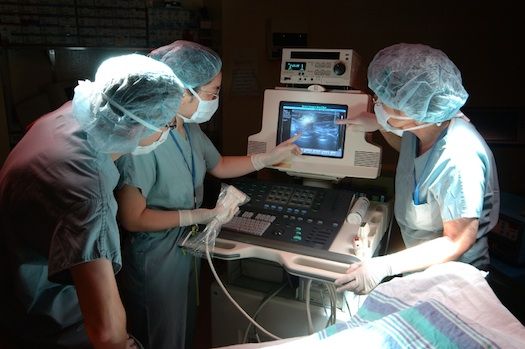
8. Always view each question under consideration of the most realistic and appropriate problem solving approach, which a practicing nurse would apply in an actual clinical situation. This skill is defined as “critical thinking” in the official NCLEX-RN® Test plan.
– Dr. Holger A Karrenberg – Owner and Director of www.nclex-tutorial.com nclex tutorial resources

9. If you have no idea on a question, rely on your most basic knowledge of the topic to work out an answer.
– Kari, RN

10. Do not listen to predictions. I studied really hard for the heart system, but most of my questions were on infection control!? Have a broad knowledge of everything
– Therese, RN
Nursing as a second career
Should You Become a Second-Career Nurse?
Author: Nurse Teeny is a community health nurse for aging and disability services in her county. Before going into community health, she was a Critical Care RN Resident on a Progressive Care Unit. She is currently working on her MSN in Clinical Nurse Leadership and will graduate in May 2012. Nurse Teeny also maintains the blog, the Makings of a Nurse.
You’ve gone to school. You’ve worked for a while… or even decades.
But something is tugging at you to rethink your course and become a nurse.
The reasons for going back to nursing school are as diverse as the academic options available. Many of us were inspired by positive encounters with nurses either when we or our family members were patients. Others may have had experiences that encouraged them to become nurses and lead by example.
Anne Taliaferro, a public health nurse, was working in research and considering a career in health care. “I knew I was interested in science and in translational research,” she says. “I love taking things from bench to bedside. Now I take ideas from academia to the community.”
Taliaferro ultimately chose nursing over medicine because of the person-centered focus it offered: “There are so many reasons why I was drawn to nursing. The best one came up in conversation with a family friend as I was applying to schools. She explained that the difference for her between nursing and medicine is that when you enter the patient’s room, if you’re a doctor, you reach for a chart; if you’re a nurse, you reach for a patient’s hand.”
One message is clear, however. If you are in it for the money, you won’t last long. Contrary to popular belief, nursing is not “recession-proof”, particularly for new graduates, and the monetary rewards will not sustain you through the emotional and physical demands of the job.
Audra Mattila, a pediatric home health nurse, advises understanding what this career really involves. “It is about entering a profession where you are truly invested in your job and your patients,” she says. “Nursing is a way of thinking and a way of life, not merely a job with a good paycheck.”
The decision to re-enter school should also not be made lightly. Despite the increasing prevalence of accelerated BSN and “alternate entry” graduate options, the process can be long and arduous. All nursing programs have a long list of prerequisites. Chances are you will spend at least a year taking these courses before you ever step foot onto a nursing school campus.
You may also find yourself having to explain your choices to skeptical audiences. Be prepared for questions and doubt in unexpected places, including from fellow nurses. “I have gotten some very blunt remarks about how I won’t be as successful or as prepared as someone who did it the ‘right’ way,” says Jennifer Vitti, an Alternate-Entry Nurse Practitioner Student.
Despite these challenges, many nurses are glad they took the leap. “I love nursing and would do it exactly the same way,” says Taliaferro. “My education has been a long process, but I am who I am and am able to do what I do well because of the experiences I had throughout my education.”
So how do you know if nursing is right for you? You’ll never really know until you are in the trenches. There are some simple steps you can take, however, in preparation for your journey:
- Get trained as a Certified Nursing Assistant (CNA), Medical Assistant (MA) or Paramedic (EMT). Not only will you learn skills that will give you an advantage in nursing school, but you will be able to appreciate the roles these providers play… a valuable lesson to learn early!
- Find a non-clinical health care job. Learning systems and being comfortable in a health care setting is half the battle. Look for unit secretary and technician positions which will let you interact directly with patients and families (if you can, keep the job through nursing schoolso that you can apply internally for RN positions).
- Volunteer at a hospital. It really is valuable exposure. Plus, it is a great opportunity to meet nurses and pick their brains.
- Read nursing blogs. Learn about the good, the bad and the ugly now. Nursing is rewarding, but it is far from romantic. Don’t be shy… many bloggers are very willing to answer questions via email.
- Ask your prospective nursing programs the tough questions. What percentage of their graduates have jobs within three (and six) months, particularly in this economy? Do they offer nursing career support? What is the process for airing grievances as a student? Also, find out if there are current students willing to speak honestly about their experiences. Make sure you really understand the degree requirements.
Second-career nurses are good for the profession. “I think that as a second degree nurse, I have strong critical thinking skills supported by life experience,” says Mattila. “I am able to communicate with and relate to my patients and families in ways that I would not have been able to when I was younger.”
The decision to go back to school and become a nurse is personal and individual. Make sure you are honest with yourself about the reasons for making the choice to go into nursing.
Starting Out in the Nursing Field: Interview with Theresa Brown, Second Career Oncology Nurse
Bio: Theresa Brown, a former college English professor, is a second career oncology nurse who blogs about her experiences in the field for the popular New York Times “Well” blog. She is also the author of the book, Critical Care: A New Nurse Faces Death, Life and Everything in Between. Below she talks about what nursing is really like and what motivated her to change careers to become a nurse.
Q: What is your current position?
I am a floor nurse in an oncology unit.
Q: What motivated your decision to change careers into nursing?
It was a combination of two things really. I had a slow realization that I didn’t want to be a professor the rest of my life. Then I became a mom, and I found being a mother rewarding. I wanted to be with people and take care of them in a concrete way. I never really thought about nursing. I had a midwife during my pregnancy, but it had never crossed my mind that I could become a nurse. Then a good friend, who is also a nurse, told me, “You could do that.” I looked into it and was hooked very quickly.
Q: What education did you pursue to become a second career nurse?
I searched the Internet for programs. We were living in central New Jersey at the time. I found an accelerated nursing program. Anyone who already has a college degree in anything, be it English or psych or whatever, can do an accelerated nursing program and get a BSN. I had to take a lot of science prerequisites, and I ended up loving them. I really was not up for getting another college degree, so I had to find a nursing program that wouldn’t take another four years, and then figure out what classes I had to take and when I had to take them. As soon as I knew I could get a BSN degree, it all just fell into place pretty quickly.
Q: How did your previous career impact your nursing practice?
Good communication skills are talked about a lot, but they really make a huge difference. Having a lot of practice communicating, having taught writing, I’ve really thought a lot about how to interact with people and get across information-that’s invaluable. Having been a professor and being older, I think I came in more comfortable with doctors than a lot of nurses are, and that’s very helpful too. It’s easier for me to see them as colleagues who are doing different pieces of a very important job.
Q: Did you feel like your nursing school prepared you well for nursing on the floor?
I would say in some ways, yes and in some ways, no. I graduated from the accelerated nursing program at the University of Pittsburgh, which was a year-long program. In terms of the intellectual background and science training, Pitt did a great job. The one thing I wish we had more of, though, was more clinical experience or more in-depth clinical experience. I think because it’s only a year, it felt like once I got on the floor, I could have used more clinical experience. A lot of nurses come out of school feeling that way, though. You’re in fairly large clinical groups-five nurses and one instructor. Also, the nurses who are on the floor have to get their job done, and they don’t always have the time to teach students.
Q: How was the accelerated degree perceived by other nurses you worked with?
There is a chapter in my book in which I talk about my first job because there was a lot of bullying, an unfortunate truth about nursing. To me, it felt like a combination of things: I had done an accelerated program and so I wasn’t as clinically prepared as I could have been; I was older; I had a PhD in English. I’ve heard from other nurses at other hospitals that there can be hostility between nurses and sometimes a feeling that some nurses don’t want someone who “has better credentials” or who “knows more” coming in and making them look bad. I work with BSN nurses, diploma nurses and nurses who went to community college, and they’re all good nurses. My true and strong feeling is that all nurses should have a BSN because it would raise the professional profile of the job. When people say M.D., they know what that means, but with nurses you don’t know. For everyone who wants to be a nurse to get a BSN though, there needs to be money available to financially help those nurses who can only afford diploma programs.
Q: How would you describe your first few days in your nursing position?
A whirlwind of activity! I was lucky because I started out with this wonderful and gentle preceptor, and she was so calm and patient. The first day I just shadowed her and I thought, “Oh, this looks okay.” I tried to absorb as much as possible, and then when I started, she was just incredibly warm, and I could handle the work. It really was a blur of patients, doctors, other nurses, and aides, and I thought, “Who are all these people, and how am I going to talk to them? I don’t know anyone’s name.”
Q: How long did it take you to feel comfortable in the environment?
Probably about six months total. I’ll pass on a very good piece of advice I got from another nurse about when I would feel comfortable, “Someday it’s just going to click in your head, and you’re going to say ‘oh, I get it.'” I held on to that idea, and then it happened. There are still moments when I feel like I don’t know something, but there was a point when I just got it. I can’t put into words what that is or how it happens, but it does happen. And I tell other new nurses the same thing. People say it takes a year to learn any job, and I would say that after a year, you feel like, “alright I have my feet on the ground.” Not that things can’t come up that will knock you off your feet.
Q: When you started your first RN position, was there anything that surprised you?
How chaotic it was. Hospitals are incredibly chaotic, and a lot of what you have to learn as a nurse is how to navigate that chaos. For example: “I need to call the doctor. How do I find the phone number, etc?” All the stuff that now is completely second nature to me, I found incredibly confusing when I first started. Some things sound really serious but aren’t, and other things are really serious, but don’t come across that way. A lot of learning how to distinguish between the two is just experience.
Q: What do you think is the most difficult aspect of nursing?
I would say managing the chaos and all the idiosyncrasies of the system. Also, since I’m in oncology, there’s the emotional work of the job. But overall, I feel like nurses have so much to do and are always being given more. Nursing also doesn’t get the institutional respect that it really needs. We’re working so hard, and we care so much about the patients, and often I feel like in health care in general, we aren’t getting the help we need.
Q: What advice do you have for a new nurse about managing the emotional element of nursing?
Make sure you’re somewhere where you can talk to your colleagues. Don’t bottle it up. You’ve got to process it. If you’re the kind of person who needs to get feelings out, and you’re working on a floor where people tell you to suck it up, that’s not going to work. You have to find a floor where you’re emotionally comfortable.
Q: What do you enjoy most about the nursing field?
The patients. I love patients; I love helping the patients. I also love my co-workers.
Q: Can you describe your experiences with health care coworkers?
In general, I have positive experiences with coworkers and doctors, but there is a streak in hospitals of people handling stress by taking it out on other people. This often takes the form of bullying, shouting, and people losing their tempers. That needs to stop. Every person, whether it’s a housekeeper, the chief nursing officer or the head of cardiology, needs to be held to professional standards of behavior. We have people’s lives in our hands; we need to have good communication and work together.
Q: How would you describe your patients?
Brave. They’re all brave. They’re all dealing with this very scary diagnosis, and they handle it. They’re not perfect; they’re all human, but they handle it, and their families handle it. It’s quite remarkable to see what families are willing to do for each other. This job has made me feel really good about being married because I see couples – whether it’s the wife or the husband who’s sick – who are really there for each other. It’s quite profound to see that.
Q: Do you have any particular advice for those considering a career change into nursing?
Nursing school is a slog. You think you’re never going to finish, but then you do. You start this great job, and it’s so rewarding – the job makes everything you go through in school worth it.
Resume tips
Getting the Nursing Job: Resume Tips
Author: Jennifer L.W. Fink, RN, BSN is a professional freelance writer with almost a decade of experience as a Registered Nurse. She’s worked in both hospitals and nursing homes as a med-surg, geriatric and transplant nurse. Her national publication credits include Parents, RN, Ladies’ Home Journal, Nursing Spectrum, Pregnancy and Journal of Christian Nursing.
The nursing job market is projected to experience more growth in the next decade than the market for almost any other profession, but still nothing is ever guaranteed. Finding the perfect job for you involves mastering the art of the job hunt from networking to writing impressive cover letters and resumes and interviewing with ease.
Find out what it takes to secure a nursing position and how to create a winning resume with advice from an expert nurse recruiter and manager, both of whom have helped countless nurses navigate a tricky job market.
What if I don’t have any “real” nursing experience? What should I put on my resume?
Don’t sell yourself short! Structure your resume to highlight your experience and skills, says Gail Biba, RN, BSN, CNRN, nurse manager of the neuroscience intensive care unit at Johns Hopkins Hospital. If you’ve completed an internship or externship, list it prominently on your resume. You can also include a brief list of your clinical rotations. Biba likes to see a bulleted list of clinical skills – such as experience with certain types of catheters, cardiac monitors and central lines, as well. Include seemingly unrelated work and volunteer experience. Johns Hopkins, Biba says, strongly values volunteerism, and she likes to select new hires that fit well with her unit’s culture of service.
I have an ADN, but my dream job is at a hospital that gives preference to BSN-prepared nurses. Should I still submit a resume?
Absolutely, says Donna Cardillo, Career Guru for nurses, who is a contributor and expert for Nursing Spectrum, NurseWeek Magazine, DoctorOz.com and the former health care careers expert for Monster.com. “Employers may prefer a lot of things,” Cardillo says, “But when all is said and done, they are looking for a candidate with a lot of personality, someone who’s got life and enthusiasm, and not just a certain credential background.”
To get past the “BSN-preferred” hurdle, try addressing the issue directly in your cover letter. “Mention that you understand that having a BSN is important and that you are committed to lifelong learning and have a plan to pursue your BSN degree,” Cardillo says.
I’m interested in critical care nursing, but all of the critical care job ads ask for previous critical care or med-surg experience. Should I give up on critical care for now?
Not necessarily. While some critical care units will only hire experienced nurses, others are open to qualified new grads. Johns Hopkins Hospital, for instance, requires prospective critical care RNs to have completed either a clinical rotation through an ICU or an internship or externship in an ICU. If you have that experience and are interested in critical care, you should definitely apply. As a nurse manager of a critical care unit, Biba wants applicants “who can hit the ground running,” but understands that there’s no way your basic nursing background can fully prepare you for a job in the CCU. So she looks for nurses who are passionately interested in critical care and who view the family unit as their patients. She also looks for a willingness to learn. Highlight those qualities on your resume, and there’s a good chance you’ll get an interview.
Donna Cardillo suggests attending local chapter meetings of the American Association of Critical Care Nurses. “Job ads are only one source of finding a job,” Carillo says. “If there’s something you want to do, you should rub elbows with those already doing it.”
I’ve sent out a ton of resumes, but haven’t gotten any calls for interviews. What should I do?
Number one: Brush up your resume. Have a friend comb through it for grammatical and spelling errors (correct any that are found). Tweak your resume to highlight any and all relevant nursing experience, including part-time jobs and clinical rotations.
Then, try a change of tactics. “Sending out resumes and cover letters is the least effective way to find a job,” Cardillo says. “It’s okay to submit applications, but new nurses should focus on networking. Get out to local chapter meetings. Attend career fairs. It’s more work to physically get out there, but face-to-face networking is the most effective way to find a job.”
Interview tips
Getting the Nursing Job: Interview Tips
Author: Laura Raines is a freelance writer and editor of “Pulse,” a nursing and allied health publication published by the Atlanta Journal Constitution. She is also a regular contributor to the AJC on the subjects of jobs, careers and education.
Finding a nursing job used to be clear sailing-there was a shortage of workers. In today’s economy, the waters are considerably choppier. Expect to apply repeatedly, and wait for a call.
“Today’s job market is a perfect storm,” says Kay Spruill, executive director of recruitment for WellStar Health System in Atlanta, Georgia, which received more than 200,000 applications for open positions last year. Decreased patient volume, increased nursing graduates, hospital budget tightening, older nurses delaying retirement, and experienced clinicians returning to the workforce all make for “an extremely competitive market for nurses, especially new grads,” Spruill says.
To secure employment you’ll need to steer wisely through the interview.
Ask yourself…
Am I dressed and acting professionally?
Wrong: Wearing Jeans, flip flops, or too much perfume or jewelry; showing cleavage; coming in with long painted fingernails (a health hazard to patients); being late; texting; chewing gum; using inappropriate language and not making eye contact.
Right: Being well-groomed and wearing business attire, completing a test drive to ensure you know where the interview is and will arrive early, shutting off or silencing your cell phone, greeting your interviewer with a firm handshake and smile which shows confidence and enthusiasm.
“You’re asking a nurse manager who works 24/7 with life and death responsibility to spend an hour with you. Show respect,” says Spruill.
“A professional appearance translates to a sense of pride in yourself and your work,” says Terri Veneziano, vice president, nursing clinical and business operations, at Robert Wood Johnson University Hospital in New Brunswick, New Jersey. “Not making eye contact raises the question of low self-esteem or dishonesty.”
And I want this job why?
Wrong: Not knowing about the organization or how your qualifications fit the job; not answering questions directly; not showing interest in the position or work environment.
Right: “Research the organization and people you’ll be meeting using the employer’s website, Google and LinkedIn. Ask yourself how your career goals fit the mission of the organization and what extra you can bring to the job,” says Diane Smith, principal for nurse recruitment, DHR International, Cincinnati, Ohio. “An interview should be a comfortable conversation. The more you know, the better it will flow. Strong communication skills always impress,” says Smith.
“Be ready to articulate from a nursing perspective why you want to work here. That’s crucial,” says Veneziano. “The best answer is that you’d be proud to work here because of our reputation, values or what you can learn. Show us your passion for nursing and how you share our commitment to patients,” says Veneziano. Successful nurses take pride in what they do.
And I stand out how?
Wrong: Assuming a degree and fulfillment of minimum requirements will get you hired.
Right: “In this market, many candidates will have the education and clinical skills needed. It’s the soft skills that make you stand out,” says Spruill. “Your resume tells us you can do the job. We’re interested in how you’ll do the job.”
“We can teach you oncology nursing; we can’t teach you a positive attitude,” says Smith.
Draw from all your past experiences for examples of your integrity, responsibility, initiative, flexibility and team work. “One applicant put herself through school by babysitting. She always engaged children and impressed parents. That told me a lot about her reliability, resourcefulness and customer service attitude-which her references confirmed,” says Spruill.
Am I ready for the tough scenario and behavioral questions?
Wrong: Not anticipating behavioral/situational questions, which all interviewers ask. For example, how would you handle a difficult coworker? If a patient in the ICU was dying, would you let the family stay past visiting hours? What prepares you for the frantic pace of the ER?
Right: Knowing examples of how you met challenges in the past and what you learned from them. “People get thrown off by touchy-feely questions, but that’s how we learn about your critical thinking skills, your ethics and your values,” says Veneziano.
“Be honest about why you were laid off or changed jobs, but keep it factual and positive,” says Smith. “Bitterness, negativity and trashing a former boss never play well.”
Additional interview tips from Diane Smith:
5 top specialties for new nurses
Top Five Areas of Nursing for New Graduates
Author: Terri Polick has been a nurse since God was in diapers.
Congratulations. You’ve passed your NCLEX Examinations and you are officially a registered nurse. Now it’s time to look for a job, but as a new graduate, where should you start? We’ve highlighted the five jobs in nursing almost guaranteed to turn new nurses into seasoned professionals.

Medical Surgical Nursing
Thanks to Hollywood, a lot of new nurses want to start their nursing careers in the emergency room. The ER and other specialty areas may look glamorous, but they really aren’t a place for rookies. New graduates who want to work in a hospital should seriously consider working at least one year in a general medical surgical unit before they take a job in a specialty area. A medical surgical unit will allow you to develop your basic nursing skills while you learn about a wide variety of medical conditions and illness. Look for a hospital that offers nursing internship programs. These programs offer new graduates the support they need as they transition from nursing student to professional nurse. Get your foot in the door early-the best way to land a job in a good unit is to work in a hospital as a CNA before you graduate nursing school.

Gerontological Nursing
We all get old, and as we age, more of our ranks will need gerontological nurses to care for us in our homes and in community health centers. These nurses have expertise in meeting the physical and psychological needs of the elderly. New graduate nurses who enter this field have the opportunity to learn about an array of medical and psychological issues that will help them build their nursing knowledge while they enter an expanding health care industry. The US Bureau of Labor Statistics projects that nursing in general will be one of the fastest growing careers within the next 10 years, and the fastest growing population of people will be those over 85 years old. Gerontolgical nurses deal with death and dying on an ongoing basis, though, and it can be difficult to watch the decreasing mental and physical health of patients to whom you’ve become attached.

Military Nursing
The U.S. military is a great place for nursing graduates who want to jump-start their nursing careers. Graduate nurses who join the military are given special mentorship by some of the most highly educated and proficient nurses in the world. The patient to nurse ratio is much lower in military hospitals as compared to their civilian counterparts. This ratio allows new nurses to learn nursing assessment skills without feeling overwhelmed. Military nurses work in multiple specialty areas, in world-class facilities and within a collegial environment. The military offers many benefits as well, including: signing bonuses, continuing education opportunities, and tuition reimbursement.

Public Health Nursing
The U. S. Public Health Service Commissioned Corps also offers new graduates a place to grow as a professional nurse. Their mission is to promote public health and disease prevention programs while improving public health science. New graduates receive mentorship from public health experts and make a powerful impact within disadvantaged communities. In most cases, Commission Corp nurses also receive the same benefits that members from uniformed services receive which include: continuing education opportunities, tax-free accommodations, meal allowances, a month of paid vacation per year, malpractice insurance coverage, and tuition reimbursement.

Second Career Nursing
Many nursing graduates entering the health care arena are older individuals who are starting a second career. These individuals have the opportunity to use skills obtained in their first career when they enter the nursing profession. A former public school teacher might be perfect for a clinical nursing instructor position. A one-time IT specialist, on the other hand, would be a great fit for the field of nursing informatics. Employers are looking for people with experience, so cash in on all the things you know. Your nursing education plus life experiences will open up a lot of doors when you’re looking for a job.
5 more nursing career options
Five Creative Career Choices for Today’s Nurse
Author: Lorry Schoenly, PhD, RN is a nurse writer and educator with over 25 years of experience. She has been certified in five different clinical specialties including critical care and emergency nursing. Starting as an associate degree registered nurse, she continued her schooling in traditional and distance-learning settings to obtain a BSN, MSN, and PhD in nursing while working full-time and raising a family. Lorry teaches nursing in a variety of settings including webinars and online nursing courses.
One advantage of a nursing degree is how versatile it can be in a changing job market. Nurses have a variety of traditional settings to choose from when considering a career path like working in a hospital, doctor’s office or other health care facility, but there are also several innovative options available. Consider one of these five creative careers for which your RN license will qualify you.

Case Management
Case management nurses (CMNs) work to improve the efficiency and effectiveness of health care plans for particular patients. They are employed by hospitals, medical groups and insurance companies to improve patient outcomes while containing treatment costs. They do this by coordinating services across various health care providers thus eliminating delays or omissions.
Individuals who are successful case managers excel at project management and negotiation. Good communication skills are important, as case managers interact with patients, families and care providers regularly in order to coordinate care and provide resources for the patient.
Because case management requires an extensive understanding of systems and processes of care for a particular health care specialty, most employers look for nurses with several years of applicable experience. However, new nurses with extensive health care background in another position may find opportunities in case management. For example, a dietician or social worker who is now licensed as a nurse may find a rewarding career as a diabetes or psychiatric case management nurse.

Forensic Nursing
Forensic nurses apply health care principles to the criminal justice system. The field of forensics is relatively new as is the forensic nursing specialty. Forensic nurses conduct exams and collect samples from those who are suspected to have suffered sexual assault, child abuse or domestic violence. Forensic nurses may also work for the coroner’s office or with forensic pathologists to gather evidence in questionable deaths.
Duties vary depending on the setting; however, a key function of the job is obtaining and preserving medical evidence for legal use. In addition, forensic nurses work with crime victims and their families to obtain information for use in legal action.Forensic nursing combines the detailed work of evidence investigation with the communication skills needed to engage traumatized and suffering individuals in discussion about sensitive topics. A background in emergency care and an understanding of the legal system are helpful.
The growing need for nurses in this specialty is a boon for new nurses. If you already have a legal or emergency background, such as, as a paralegal or a paramedic, you have a jumpstart on a forensic nursing career. In addition, certification programs can help establish credentials for newer nurses are trying to enter the specialty.

Travel Nursing
Travel nurses work through an agency to accept time-limited nursing assignments in a variety of settings and locations. Both short-term need and chronic shortages require health care facilities to fill staff vacancies with qualified nurses interested in regularly changing their work setting. Travel nurses accept assignments with specialized agencies to work for a limited time in hospitals, long-term care facilities and even prisons or jails.
Travel nurses must be able to orient and fulfill necessary job requirements quickly. Successful travel nurses select assignments that align with their prior work history. They are flexible, self-directed and easy to get along with.
Many nurses like travel assignments because they enjoy the variety of the job. Some use traveling nurse assignments to try out a new area of nursing or a potential new place to live.
You can find a travel position as a newer nurse, but should be careful to work with an agency that will help you find a good match. Most agencies want at least 18 months experience as a nurse before matching you with travel assignments.

Life Coaching
Personal coaching is growing in popularity as a means to get organized, overcome obstacles and gain life skills. Life coaches work with individuals or small groups to reach personal and professional goals. A growing number of nurses are using their health care expertise to become life coaches and help those who are struggling with particular health care issues.
Nurses act as a change agent in their clients’ lives by helping with problem-solving, motivation and accountability. These nurses are insightful, able to listen empathetically, and provide moral and practical support and encouragement. Other helpful skills for life coaching include being able to collaborate with a diverse group of individuals and knowing how to motivate different personality types.
Nurses successful in the life coach role are self-aware and mature. Many new nurses come to the profession with a background conducive to coaching others. Life coaches often operate as independent practitioners or are loosely aligned with general coaching groups and associations.
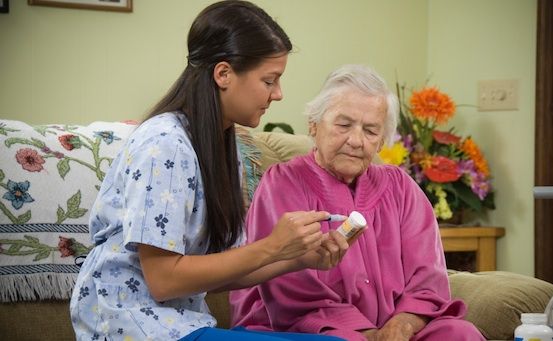
Nurse Entrepreneur
Nurse entrepreneurs start and run their own businesses. Nurses can provide support to patients through home care services, patient education programs and telehealth businesses. They may start consulting businesses providing expertise to insurance companies and law firms, or they may provide services to health care businesses, educating staff. Nurses can also work independently as writers and speakers in their specialty area.
The duties of a nurse entrepreneur are varied and specific to the business focus; however, most businesses involve management functions such as marketing, financial management, and customer service. Successful nurse entrepreneurs are highly motivated and enthusiastic about their product or service. They are self-directed and hard-working.Newer nurses with a creative idea or service should consider a career as a nurse entrepreneur. It may take time for a new business to grow toward profitability, so finances should be carefully considered.
Why you need malpractice insurance
Why Nurses Need Malpractice Insurance
Author Terri Polick has been a nurse since God was in diapers. Read more at Nurse Ratched’s Place.
You think it can never happen to you. You’re a competent nurse. You care for patients to the best of your ability, but one day something goes horribly wrong. What do you do?
Protecting Your Interests with Malpractice Insurance
Nursing Associations suggest that all nurses purchase their own malpractice insurance. There is a common belief that only physicians, surgeons, hospitals and clinics get sued. While they make up the bulk of malpractice defendants, the truth is anyone with a professional healthcare license can wind up in court. Traditionally, the legal system viewed the doctor as the “Captain of the Ship,” and he or she was held responsible for the actions of all other staff members involved in a patient’s case. Today’s legal system views each member of the healthcare team as a licensed individual who is responsible for his or her own actions. If you are a licensed professional nurse, and you are accused of departing from the standards of practice, and that departure causes injury or death, you are at risk for getting sued.
Limitations of Employer Malpractice Insurance
How will you defend yourself if you become involved in a malpractice lawsuit? Don’t count on your employer to come to your rescue. It is a misconception that an employer’s malpractice policy is an employee benefit. The policy may have substantial gaps in coverage, and is in place to protect the employer, not the employee. The usual strategy during a court case is to make the employee look good so that the institution looks good too; however, if there is a conflict of interest, the employer’s legal team may not think twice about sacrificing an employee in order to keep their client out of trouble. It’s times like this that nurses need legal representation that has their best interest at heart, and malpractice insurance will enable a nurse to hire his or her own attorney.
Employer malpractice insurance also has other serious gaps. For instance, it may not cover all damages that are awarded in a lawsuit, and it will not cover an employee who gets sued over something that happens outside of the workplace. Nurses are frequently asked for curbside consults from friends and family, and they can get sued if something goes wrong.
Defending Your Nursing License
An employer’s malpractice insurance also has one other little-known shortcoming that has tremendous consequences for nurses. An employer’s policy does not offer licensor protection. This coverage is critical if you have to go before your state Board of Nursing to protect your nursing license.
Many nurses believe that their state Board of Nursing was created to protect their nursing practice, but the mission of the Board of Nursing is to protect the public’s welfare, not necessarily a nurse’s career. Each state has a Nurse Practice Act, and the Board of Nursing is charged with its enforcement. It’s important to remember that anyone, including an employer, can lodge a complaint against a nursing license, and in the situation where the employer reports a nurse, the employer is not going to spend money to defend that employee. Having your license challenged is a frightening experience, and even “good” nurses can find themselves under investigation by the Board of Nursing. Nurses need legal representation to protect their legal interest when they have any adverse legal interaction with their Board of Nursing. Malpractice insurance, which includes administrative/regulatory board coverage, can help nurses protect themselves.
The Truth About Malpractice Insurance
There are many misconceptions about malpractice insurance that keep people from buying policies. The biggest misconception is that you are more likely to get sued if you carry malpractice insurance. This is not true. There are many reasons why a nurse could become embroiled in a malpractice suit and having malpractice insurance doesn’t alter those reasons. Malpractice insurance is inexpensive and provides coverage to protect you and your nursing license.
You can find more information about malpractice insurance at proliability.com and at nso.com.
Technology toolkit
We hear all the time about just how much technology is impacting modern life, and if you work in the health care field this is particularly true. For nurses, for example, technology has changed the face of everything from training programs, which now can have advanced virtual life and simulation components, to nursing practice in which a world of information on medications and diagnoses is loaded onto handheld devices. Below we’ve gathered our top 10 nursing apps and technologies, guaranteed to improve your nursing practice whether you’re still in training or already on the job. Click on the play button to view these tools in action.

AccuVein
Description
Already used by hundreds of hospitals, AccuVein is a lightweight, handheld device that allows nurses to quickly pinpoint hard to find IV sites for needle placement by using infrared technology.
Why it’s helpful
When nurses find it difficult to locate veins in patients, the AccuVein quickly displays exactly where to place a needle – plus you can take this device to-go.

Nursing Central
Description
Designed to answer your burning nursing questions from disease symptoms to term definitions, Nursing Central contains a database of over 5,000 drugs and 60,000 nursing terms, all in an easy, mobile download.
Why it’s helpful
At $159.95 the price tag might seem steep, but many nurses say that just having a copy of Davis’s drug guide at their fingertips, makes this app worth it – the multitude of other features could be considered a bonus.

Informed RN Pocket Guide
Description
This pocket guide originally started in print, but now comes in an even more convenient e-format ($5.99). It boasts assessment tools for the novice and seasoned nurse alike, with information covering pediatric, respiratory, GI, mental health topics and more.
Why it’s helpful
Both nursing students and professors rate this app highly. You have access to medical calculators and assessment tools, which are divided into categories such as cardiac or neurological tools. Plus, the low cost makes this app an accessible essential.
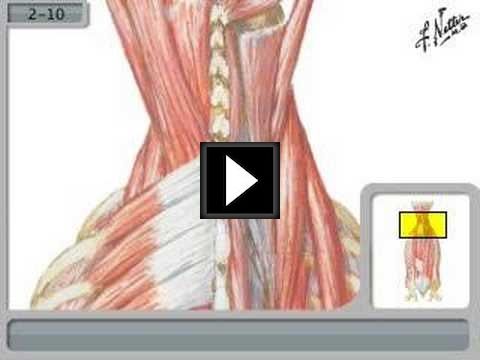
Netter’s Anatomy
Description
Netter’s anatomy has long been a best-selling anatomy primer, but now 300 formerly print cards have been reworked into an easy to navigate app that will give you detailed views and information on all the structures of the human body.
Why it’s helpful
The $39.99 asking price might seem a bit steep for an app, but once you download the Netter’s Anatomy flashcards, they are yours – no renewal or subscription needed. For students in particular, the built-in quiz feature will be indispensable.
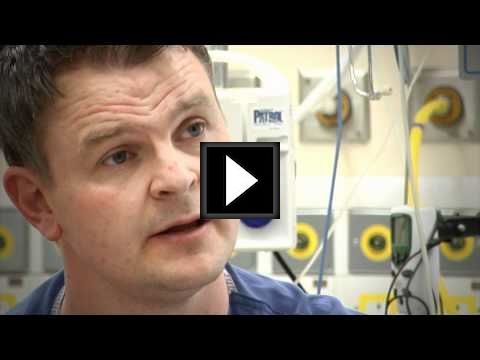
Simulation mannequins
Description
Nursing schools have been using patient simulators for years – with simulation becoming ever more realistic. Nursing students can practice procedures on a range of patients. There’s even a fully equipped birthing simulator that lets users train to assist in births.
Why it’s helpful
Simulator software gives students the opportunity to interact with the same tools and scenarios they would encounter in the field. The simulators don’t replace real patients and clinical rotations, but they do give students a chance to make mistakes as they learn without anyone getting hurt.

Second Life
Description
Originally intended as simply a social game, Second Life lent itself well to e-learning, letting students and teachers create avatars and virtually attend classes. Everything from lecture halls to hospitals can be recreated and students can navigate any nursing scenario that can be imagined.
Why it’s helpful
Vanderbilt University was the first to implement the Second Life system as a learning tool for nurses. Instead of meeting in an actual classroom, students meet in a virtual Second Life classroom, something they can do from the comfort of their own homes.
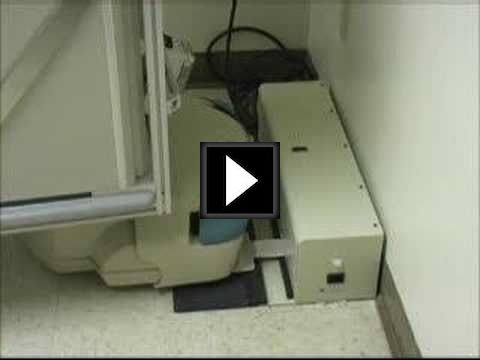
TUG
Description
Over 100 hospitals in the US now make use of the TUG, a robot developed by Aethon that can be programmed for pick-ups and deliveries and lug up to 500 pounds. Once installed with a hospital blueprint the TUG can pick up and deliver medication, food, and lab results, using lasers to avoid obstacles along the way.
Why it’s helpful
Nurses at Sinai Hospital in Maryland are working with the TUG robots and seeing great results. In fact, one tug can do the pick up and delivery work of over two nurses. With a looming nursing shortage, that’s a huge benefit and frees up staff for more direct patient care.
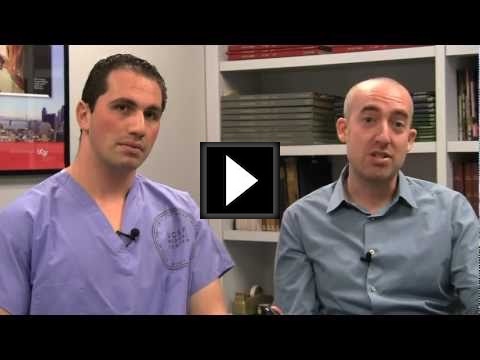
Medibabble
Description
The US is a constantly evolving melting pot of various languages – Medibabble is an app that helps health care workers navigate all these languages. It’s programmed with a multitude of diagnostic questions and exam instructions designed to help eliminate any possible language barrier.
Why it’s helpful
Some reviews suggest that this app might need some updates – even so the tool is free, loaded with multiple languages, and programmed for a variety of medical situations. A translator may not always be available, so Medibabble is worth having on hand.
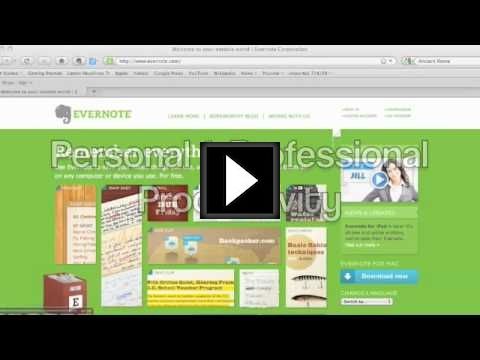
Evernote
Description
Writing things down is almost archaic these days, so consider Evernote your high-tech to do list alternative. Keep track of study materials, web pages, journal articles, documents, memos and yes, even notes. Sync them to any mobile device, and you’ll have handy reminders wherever you are.
Why it’s helpful
Nursing students and professors can use Evernote as an organization tool. When study material, projects, and papers start to pile up, use Evernote to keep things together in one place. All the content in Evernote can be stored, labeled, dropped into folders and categorized in whatever way makes the most sense for you. Best of all, Evernote is free.
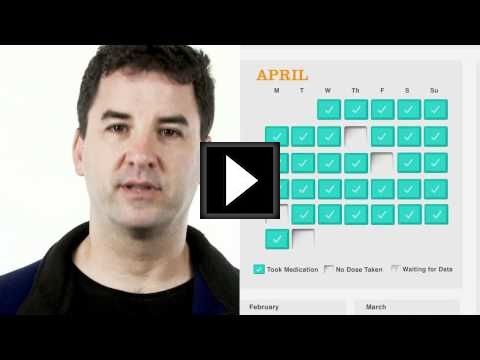
Smart pill bottles
Description
They may look like a regular prescription pill bottles, but the Vitality Glow Caps are anything but. The GlowCap has an embedded wireless chip, which can be programmed for personal reminders. When it’s time to take medications, the bottle will alert you with lights, bells, and even a phone call. Once opened, data is sent to your care provider – invaluable for coordinating care and keeping track of patient adherence.
Why it’s helpful
As a tool for nurses and those in the medical field, smart pill bottles like the GlowCap allow for less time spent monitoring patients pill intake. For geriatric patients, in particular, this technology is a lifesaver, not only reminding patients to take pills, but communicating with their web of health care providers and even refilling prescriptions.
Reality vs. expectations survey
Survey Results
BestNursingDegree.com asked experienced nurses to sound off about what the nursing field is really like. Was nursing what they expected? Would they recommend it as a career? What kinds of things do they think that nursing students should be aware of? What do they love or hate about their jobs? If you’re considering nursing, read on for veteran nurse opinions on everything from what nursing specialty to start in, to what to expect from your fellow health care workers.
1. I have a(n):
- A. LPN
- B. ADN
- C. BSN
- D. MSN

2. I work in:
- A. A hospital.
- B. A doctor’s office.
- C. Home health.
- D. A nursing home.

3. I’ve been a nurse:
- A. Less than 1 year.
- B. 1-5 years.
- C. 6-10 years.
- D. More than 10 years.

4. My first job after nursing school:
- A. Was like I had expected it to be.
- B. Was mostly as I had expected.
- C. Was somewhat as I had expected, but there were a lot of things that surprised me.
- D. Was nothing like what I had expected.

5. The best thing about my first nursing job was (open ended question – representative answers below):
My coworkers, the patients, and finally having a job.
6. The most surprising thing about my first nursing job was (open ended question – representative answers below):
The many roles I was expected to fill, how much I learned in the field, and the reality of the nursing shortage.
7. The worst part of my first nursing job was (open ended question – representative answers below):
Having to work the night shift, figuring out how to manage my time, and working to gain the support of the more experienced RNs.
8. I think my nursing school prepared me pretty well for the challenges of working as a nurse:
- A. Agree
- B. Disagree

9. I wish my nursing school had provided me more information on or preparation for (open ended question – representative answers below):
How to fill out paperwork and charts, how to optimize the job search, and how to handle the realities of working with multiple patients at once.
10. In my first few months, working as a nurse was:
- A. A tough adjustment from the school environment.
- B. Tough at first, but got better quickly.
- C. A mixed bag.
- D. A smooth adjustment from the school environment.

11. The members of the nursing staff I worked with in my first position were:
- A. Extremely supportive and acted as mentors to me.
- B. Fairly supportive and worked as a team.
- C. Not that supportive, but working with them was manageable.
- D. Generally intimidating or not very supportive.
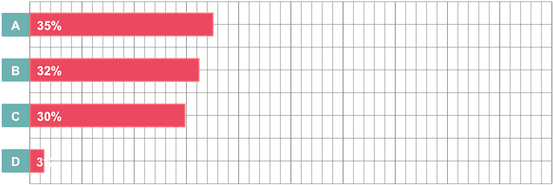
12. In my opinion, the best area of nursing to start your career in is:
- A. Med-surg.
- B. ER.
- C. Telemetry.
- D. ICU or critical care.
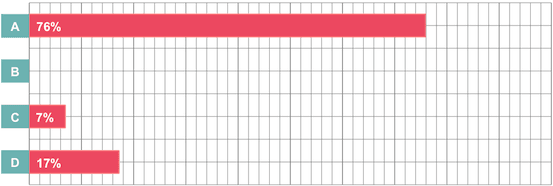
13. Please explain your answer to question 12 (open ended question – representative answers below):
Med-Surg because it provides new nurses with skills and experiences they can apply to many different areas of the hospital; ICU or Critical Care because it gives nurses a variety of skills and the confidence to move into other areas of the hospital; or whichever area of nursing best suits you.
14. The most challenging element of nursing is:
- A. Doing the physical work.
- B. Managing the emotional elements of nursing.
- C. Caring for or interacting with patients.
- D. Working with other nurses and health care professionals.
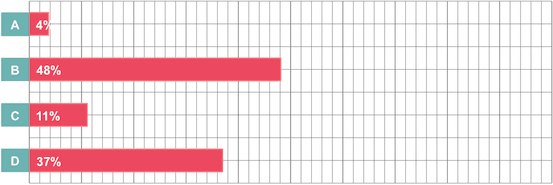
15. I spend the majority of my time as a nurse:
- A. Caring for or educating patients.
- B. Completing documentation.
- C. Working on administrative tasks.
- D. Coordinating care.
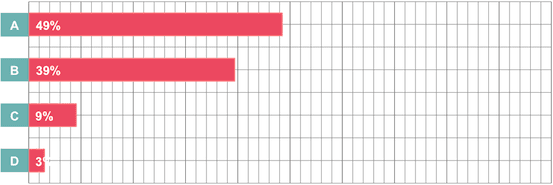
16. I have __ patients at a time.
- A. 8 or fewer
- B. 9 to 15
- C. 16 to 25
- D. more than 25
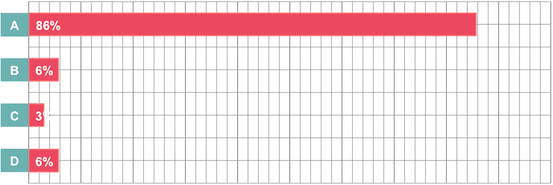
17. My patients are (open ended question – representative answer below):
The best part of being a nurse.
18. In terms of daily responsibilities, I feel like I have:
- A. An appropriate workload that matches my skill set.
- B. A workload that does not match my skill set.
- C. A workload that is a bit hectic, but still manageable.
- D. An unmanageable workload.
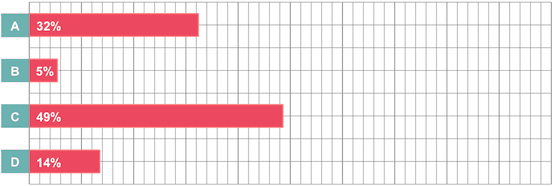
19. In general, my shifts:
- A. Are the length of time and the days that I request or expect.
- B. Are much longer than I expect or on days that I don’t expect.

20. I find doctors and other health care staff at work generally helpful and respectful.
- A. Agree
- B. Disagree

21. If I could change on thing about the nursing field, it would be (open ended question – representative answers below):
The attitudes toward new nurses in the field from both older RNs and the public, the amount of time spent on paperwork vs. patient care, and hospital budget cuts.
22. Being tech-savvy is:
- A. Very important for my job.
- B. More or less important for my job.
- C. Not that important for my job.

23. In terms of my future in nursing, I see a lot of opportunities for growth.
- A. Agree
- B. Disagree

24. In my work environment, continuing education and advanced degrees are:
- A. Required.
- B. Heavily promoted.
- C. Encouraged.
- D. Supported, but not a top priority.
- E. Not encouraged or discouraged.
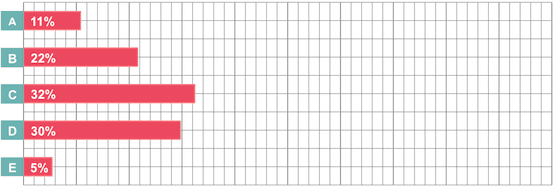
25. Overall, nursing is (open ended question – representative answers below):
A rewarding career, a profession that needs more workers, and a challenge that is worth the time and effort.
Navigating hospital politics
New Nurse Survival: The Dos and Don’ts
Author: Renee Thompson, MSN, RN, CMSRN has more than 20 years nursing experience and speaks nationally for organizations on clinical and professional development topics. She holds adjunct faculty positions at several universities in the Northeast, teaching courses in nursing research, professional communication, leadership and quality outcomes. She is the Program Chair for the National AMSN Convention, a published author and a member of the editorial board for the Medsurg Nursing Journal.
A successful transition from student to professional nurse involves more than just knowing the nursing process, disease states and five rights of medication administration. It involves an understanding of the health care environment, and how to avoid the landmines that can sneak up on new nurses when they start their first jobs.
To help you with that transition, here are the 10 dos and don’ts for new nurse success:
Do:
- 1. Know the expectations.
All nurses receive a job description upon hire. Typically we put it in a folder with the other gazillion papers we’ve received and never look at it again. As a new employee, though, you are bound to comply with the expectations and responsibilities identified in your job description. Read it. Know it. Read it again.
- 1. Know the expectations.
- 2. Build a relationship with your boss.
The number one reason people stay or leave their jobs is the relationship they have with their bosses. Your boss can be your biggest ally and can protect you from the challenges of being new. Meet with him or her regularly. Ask how you can be successful. - 3. Build a relationship with your preceptor.
Your relationship with your preceptor determines new grad competence and confidence. Agree on an orientation plan that both meets your individual needs and enables your preceptor to handle the extra work involved in orienting a new nurse. Ask your preceptor for feedback, negotiate learning opportunities and continue the relationship after the orientation ends.
- 2. Build a relationship with your boss.
- 4. Be a professional.
We communicate our competence by what we say, how we say it, what we do and what we wear. Make sure you are inspiring confidence in your patients and colleagues by always acting and looking like a professional – no matter what. - 5. Get involved.
Nursing is a career. It’s not a job. Once you’ve successfully completed orientation, find ways to get involved in the profession. Join a local nursing organization and attend its meetings. Ask to participate on a quality improvement committee or council. Take on a unit project that improves processes or work environments.
Don’t:
- 1. Stay with a bad preceptor.
If after two weeks, you’re not getting what you need from your preceptor, speak up. Don’t wait until you’re on your own before identifying that you didn’t get a good orientation. You are ultimately responsible for your orientation, so make sure you are getting what you need from your preceptor. - 2. Suffer in silence.
“Nurses eat their young.” Although we know this fact and despise it, it’s still happening. If you find yourself in a hazing situation, don’t suffer in silence – do something about it. You deserve to be in an environment where you are supported – not bullied. Confront the aggressor, tell your preceptor or go right to your unit manager. The key is to speak up.
- 1. Stay with a bad preceptor.
- 3. Do something that you’re not comfortable doing.
Many new nurses get caught up in the unpredictability of health care and find themselves being asked to do things that they’ve never done. Be careful. If you don’t follow policy, you could be held liable if the patient has a negative outcome. - 4. Associate with “energy vampires.”
“Energy vampires” are the people that suck the life out of you. They thrive on complaints, negative gossip, and the misfortunes of others. There is no room for them in a profession that is supposed to be knowledgeable, competent, caring and compassionate. When faced with an energy vampire, take the high road and walk away. - 5. Do everything yourself.
As a new nurse, you may feel uncomfortable delegating to nursing assistants or even other nurses. Many nurses will soften the request by saying, “Can you do me a favor?” This implies that they are doing something for YOU and not for the patient. Understand that the only way you are going to be successful is if you learn to delegate. Start small and start early in your career. Set the precedent that everyone has a role to play in the delivery of care.
Avoiding nursing burnout
Are You Burning Out?
Author: Jennifer L.W. Fink, RN, BSN is a professional freelance writer with almost a decade of experience as a Registered Nurse. She’s worked in both hospitals and nursing homes as a med-surg, geriatric and transplant nurse. Her national publication credits include Parents, RN, Ladies’ Home Journal, Nursing Spectrum, Pregnancy and Journal of Christian Nursing.
Believe it or not, burnout most often affects the best and brightest nurses – and new grads aren’t immune. Nursing is a tough profession, and if you don’t find a way to balance your optimism with the realities of healthcare today (short stays, high patient acuity), you’ll be on the fast track to burnout. Choose the answer choices below that are closest to your experiences to assess your risk of burnout. We’ve even included some pointers to keep you from flaming out before your time.
Low risk of burnout. You have a realistic view of the stresses of nursing, but appreciate the positives as well.
High risk of burnout. Dread comes late in the burnout process. If you dread going to work most days, it’s time to make a change. First, take stock. What’s bugging you about work? Depending on your answer, you might want to consider switching to another shift or nursing specialty. You could also cut back to part-time, switch to another career (or try something else on the side) or go back to school. You might benefit from some counseling as well.
Moderate risk for burnout. Insomnia and frequent illnesses can be signs of emotional exhaustion and burnout. See your doctor to rule out any physical causes for your symptoms; then, implement some stress management techniques. Maybe it’s time to pick up a hobby?
High risk of burnout. Sure, it’s natural to be upset about a med error. But feeling seriously underappreciated (I bet he doesn’t even realize what I do!) is a classic sign of burnout. If those feelings persist, take a look at the situation. If your work environment is truly unsupportive, it might be time to find another job. But if your accomplishments are adequately recognized, you might need an attitude adjustment. You also might need a break. Try saying “no” to extra requests at work. You’ll be surprised what a difference it can make!
Low risk of burnout. You’re handling yourself like a true professional.
Low to moderate risk of burnout. You might just be a sensitive soul. But on the other hand, if you’re frequently breaking out into tears at work, you might be on the path to burnout. Talk to a trusted friend or colleague about your feelings.
High risk of burnout. Everyone has shifts where they’re overloaded, but if you find yourself staying over on a regular basis, watch out. To be an effective nurse, you have to take care of yourself as well. Work on your delegation skills at work, and ditch the perfectionistic attitude. You don’t have to be everything to all of your patients in order to be a good nurse.
Low risk of burnout. Exercise – and social interaction – is a great way to get rid of work stress. Engaging in activities that bring you joy on a regular basis will decrease your risk of burnout.
High risk of burnout. Sure, nursing is part of your identity. But be careful that nursing doesn’t become your identity. Practice leaving work at work. If work thoughts continue to haunt your off-work hours, seek counseling to help you deal with the stress of a high-impact profession.
High risk of burnout. Burnout typically progresses through four predictable stages: physical and mental exhaustion; shame and doubt; cynicism and callousness; and failure, helplessness and crisis. If you’re ignoring call bells, things have gotten pretty bad. Stop, at least temporarily. Talk to your nurse manager. You may need some time off – and some help to process your feelings.
Low risk of burnout. You never know when a patient’s call might signify a true need!
High risk of burnout. There’s no excuse for bad-mouthing patients, especially in front of patients! Hopefully, a co-worker pulls you aside, suggests you take a brief time out and spends some time talking to you about your stress. It’s time to learn some serious stress management skills. An anger management class might not hurt either.
Low risk of burnout. Work relationships can help keep you sane! Who better to understand your stresses and concerns than other nurses? Besides, a little fun at work can go a long way toward lightening the load.
Low to high risk of burnout. Excessive chatting at the nurses’ station can simply be a sign of poor time management and priority setting. But, it could also be a symptom of patient avoidance. If you’re spending time at the desk because you can’t stomach the thought of dealing with yet another patient, you’re well on the way to full-fledged burnout. Patient avoidance may be a temporary coping strategy, but it won’t last for long. Make some changes now.
High risk of burnout. Simply going through the motions at work – doing no more than absolutely necessary – is a major symptom of burnout. So instead of simply pulling back, reassess. What drew you to nursing in the first place? Is there a way to rekindle that passion? Sometimes, shifting your perspective can be enough to stave off full-fledged burnout (though you might need professional help to do so). Other times, a new position might be your best bet.
How to juggle patients
Tips for a Successful Nursing Shift
Author: Terri Polick has been a nurse since God was in diapers.
Nursing is a tough job, especially when you’re just starting out in your new career. You have so much to do during your shift and one of the biggest challenges is learning how to juggle your responsibilities within the workplace. It can seem overwhelming at first, so we’ve outlined some of the techniques that will help you manage a busy day.
1. Get your rest.
You can’t organize your workload effectively if you start off already sleepwalking. Fatigue and sleep deprivation will set you up for a chaotic day with impaired judgment and concentration that can lead to serious mistakes. In fact, in an article published in American Nurse Today in March 2010, nurses who responded to a 2008 medication safety survey reported that fatigue increased their risk of making a medication error.
Along the same lines, some nurses try to balance too much at once. I worked with a nurse who did just that, taking on two jobs as her husband had just been laid off. She was able to make great money, but her performance faltered. In the end, she was given an ultimatum – quit the moonlight job or get fired. She later confided to me that she was glad that she was forced to leave her second job. Her work improved, and she was a much happier person.
The moral of the story: don’t take on too much. Don’t volunteer for extra shifts if you’re exhausted, and don’t work too many shifts in a row. Get some rest so you can do the best job possible when you do come into work.
2. Get all the necessary info at the start of your shift.
Ask the off-going shift for a detailed report before they leave the unit. Find out about the lab values, vital signs, and treatments due on your shift. Many hospital units have walking rounds, which allow the oncoming shift nurse to do a quick head-to-toe assessment on each patient in the presence of the previous nurse. Take advantage of these rounds and quickly check patients’ color, respiratory status, and pain levels. Also check IV lines, drainage bags, tubing, and the monitoring equipment that is by the patients’ bedsides. It takes a little practice, but soon you’ll be able to listen to report, take notes, and do a bedside on your patient all at once.
Don’t rely on memory. Instead, take detailed notes. Even create your own report sheet and make copies if your unit’s sheet is inadequate. I couldn’t squeeze everything onto the scant little unit report sheet I was given, so I created one that met my needs and took it to Kinkos. Later, it seemed like everyone wanted a copy. After all, no one wants pertinent patient information to fall through the cracks.
3. Get organized and prioritize.
Take a few moments to look over your detailed report notes and prioritize your day. Break down all your tasks, make a list, and just do one item at a time. Don’t try to multitask everything.
It’s imperative that you learn the art of delegation. Assign certified nurse assistants to perform tasks that are within their scope of practice, and ask other nurses to help you out if you start falling behind. Nurses who try to multitask too much are less efficient, make more mistakes, and are more likely to burn out at the end of their shifts.
4. Get your nutrients.
The toughest part of the work day is the last few hours when you’re sprinting toward the finish line. Don’t undercut your ability to deal with those last few hours by skipping meals. A recent study supported by the Federal Agency for Healthcare Research and Quality showed that nurses routinely miss meals to care for patients and that this practice can contribute to nurse burnout.
It may not seem like a big deal, but when you skip a meal, your body goes into fasting mode and uses less efficient energy sources. Glucose, the brain’s main fuel is compromised, and the deficiency forces your body to use fats in the form of ketone bodies. Ketosis causes fatigue, low blood pressure, and potentially, nausea, which can all impact decision-making skills and stamina.
Instead of skipping meals or setting yourself up for a later snack binge at the nurse station, bring a healthy brown bag lunch from home. That way you won’t have to leave the unit for lunch, and you’ll have food available when you need a caloric boost.
5. Get your notes together to wrap up your shift.
Take a small break near the end of your shift, even if you’re swamped so that you can recap your day and prepare for report. Go to the break room to collect your thoughts, or do what I do – go into the ladies room to look over your notes. After all, when was the last time you were pulled out of the bathroom except for an emergency? Taking those 15 minutes will help you catch loose ends and make your report go much more smoothly when the next shift comes in.
6. Get in some “me time.”
It’s really important to take care of yourself after you leave work. Fit some “me time” into your schedule. Keep in contact with friends and enjoy activities outside of the world of nursing. Limit the amount of stress you expose yourself to outside of the workplace and maintain a level of physical activity in your daily life. Nurturing yourself when you are away from work will enable you to keep juggling your nursing responsibilities when you are on the clock.
New nurse video blog
Giuliana Nava, RN
Bio: My name is Giuliana Nava. I graduated from Salve Regina University in 2010 with a BSN. I currently work on an acute medical surgical floor, specialized in strokes and acute respiratory issues. I’m in the process of applying to graduate school to become a family nurse practitioner.
Episode 1: Giuliana on Talking to Doctors
Episode 2: Giuliana on Working With a Preceptor
Episode 3: Giuliana on Delegating
Episode 4: Giuliana on Finding a Job
Clicking on the headers above will open up one of the three main tabs of the Survival Guide.
Clicking on a blue header inside those tabs will open up one of the tab’s main sections.
Clicking on the blue header a second time will close that section.
Thanks for visiting!
What Makes BestNursingDegree Different?
We are truly passionate about reaching out to current healthcare professionals to give our readers the best insight into this wide-ranging field of awesome occupations. Why are we so passionate?
One reason is that our Managing Editor is a nurse herself, dedicated to improving healthcare and the profession of nursing through education.
She talks with different types of nurses, educators, and leaders in this growing area of healthcare to get you the most up to date information on nursing education and the profession.
Some of the nursing school tips for success you can find in our survival guide to nursing include: Q&A’s, interviews, FAQ’s, and in-depth information about all kinds of nursing programs, nursing career paths, and other data that helps prospective students make smart enrollment decisions.
If you’re ready to see if you have what it takes to survive the nurse schooling application process and how to pass nursing exams, just use the tools on this page to see your nursing education options and recommendations. These topics can include nursing school application advice, nurse bullying, how long does it take to become a registered nurse, steps to becoming a nurse after high school, and average nurse salaries.
Now, let’s talk about some of the information you can find on our site, and consider some important tips before starting nursing school…
Types of Nurse’s Job Paths
As you can see by browsing the left side of our site, there are many types of nurse specialties for you to consider. Whether you want to work in family, pediatric, neonatal, acute care, or another type of specialized nursing role, we can help you understand the requirements, qualifications, salary expectations, and organizations that can help you. Your first best bet is to network with your peers and mentors in other registered nursing programs.
Our nursing school organization tips section and advice on studying is relevant whether you want to find an entry-level nursing program or a clinical nurse specialist program. You’ll want to know the requirements to get into nursing school, and we’ve got them- for every level and position in healthcare, regardless of your nursing experience.
We find that good study habits are just as important at the graduate level as they are in the undergraduate level. We recommend bookmarking this getting into nursing school advice page so you can refer to it throughout your education.
And if you have some ideas or additions we should make to this kit or our site, please let us know. We try to make it pretty clear that we want to interact with nurses with all kinds of experience levels and roles! Share your own tips for students and first year nurses with us on social media!
The nursing student interview can give you valuable insight into what you can expect in nursing school while you train. Studying for the NCLEX exam for nurses will be one of the most important times of your career. This is when your training pays off, and you can finally get that big boost of confidence that you can carry forward into your career. Your education and training are what give you the knowledge and skills to pass the exam. Earning your license will be a huge validation of your efforts.
Let’s take a look at some other topics our survival kit and site resources can help you learn more about…
Registered Nurse (RN) Programs
If you haven’t become a registered nurse yet, you might really need some guidance about where to begin. Fortunately, we want to be a top resource for people in your position. You can start learning about the nursing profession and path to licensure without leaving our site. You might want to start by reading about LPN to RN programs, or you can start reading about the different types of nurses under the specialties category.
Tips for Choosing The Best Nursing Programs Near You
Choosing the right nursing program is your first big challenge when you pursue this professional path. You will need to understand program requirements, license requirements, and figure out how to pay for your education.
Oh, and you may have the option to take classes on campus or courses with online components. There are some 100% online programs, but they require in-person clinical rotation hours, just like traditional nursing programs.
Choosing a local nursing school may be your best bet in connecting with prospective employers. But, there may be some nursing programs offered by out of state schools that have credible reputations with local facilities in your area as well.
That’s why our best advice always falls back to: Shop around. You never know who you’re going to talk to, or what door of opportunity will open up when you request information from any given accredited nursing school.
The easiest way to get started is to click on your state in the left hand side bar and contact nursing schools today.
We Explore Important Nursing Topics
One thing our site offers that you can’t find at other nursing websites is our interest in topics you may not have heard about, or don’t get discussed on other sites.
For instance, when choosing a school, do you wonder how important school rankings are?
Or, do you want to know the truth about why it can seem so hard to get into nursing school?
We enjoy tackling these types of topics that are helpful and informative, as much as we like sharing standard info, such as how to renew an expired nursing license.
The bottom line: Start with our survival toolkit, and branch out and use as much of our site as possible to become a better informed nursing student and more confident about your professional path as a nurse.
Nurse Salaries & Career Outlook
One of the main reasons why nursing students are so eager to get out into the field is the career outlook and generous salaries that are waiting. If you haven’t seen this data yet, then it’s worth a look. According to the Bureau of Labor Statistics (BLS), if you work as a registered nurse, you can expect to make an average salary of $75,330 per year (BLS, 2020).
What’s more, the job outlook for this occupation is slated for a steady 7% growth rate over the course of the next ten years.
Maybe you’re gearing up for a career in healthcare administration. If that’s your path, you can expect to earn an average salary of $104,280 (BLS, 2020). On top of that, the job growth rate in the field is expected to show a lightning-fast 32% increase in the ten-year period leading up to 2029 – a whole lot faster than what is expected in just about any other job category.
Of course, you will need some experience, and a graduate level degree in nursing to reach this level. But it’s something many nurses who are interested in roles outside of direct patient care shoot for. If you have a natural ability to lead and manage operations, as well the ability to multitask and understand how to take initiative in organizational change, administration might very well be the place for you.
Are you ready to speak with survival experts about your future in nursing?
If you know you’re ready to start learning more about nursing programs near you, then use the resources on this page to request information from your options. It just takes a few minutes to reach out to multiple schools, if you use our tools. That way, you don’t have to fill out several forms on several sites, which can be time-consuming and confusing.
Good luck on your journey towards success and survival. Hopefully, we can help you find the right education and training so you can learn what it takes to deliver quality patient care as a nurse professional!




